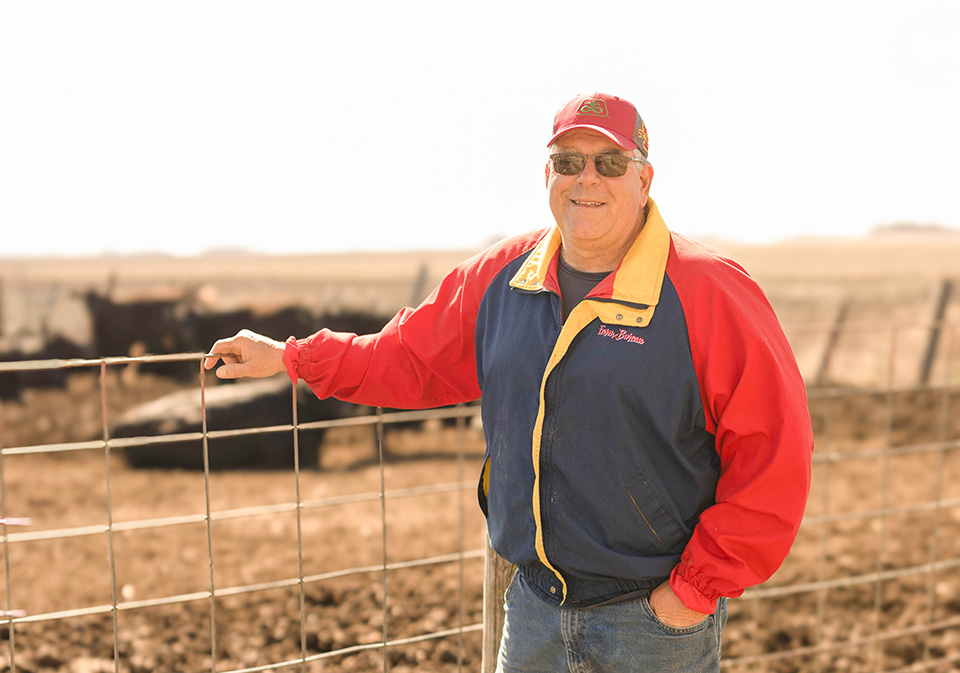
(Photo: Iowa Soybean Association / Joclyn Kuboushek)
From t-shirt giveaway to advocate membership
August 29, 2025 | Bethany Baratta
Northwest Iowa farmer Kyle Brinkman wears many hats. He's a cattleman, a pork producer, a soybean and corn grower. He's also an ag lender in Pocahontas. But his involvement in the Iowa Soybean Association (ISA) began with a free shirt, not a hat.
Brinkman responded to the association's membership drive one year ago. After joining as a member, he won a shirt. ISA Producer Services Coordinator Paige Whitney hand-delivered the ISA-branded shirt during soybean harvest.
That field visit was the beginning of his journey within ISA. With over 25 years on the Pocahontas County Farm Bureau board — including time as a voting delegate — Brinkman had a strong foundation in ag policy. When Whitney came by with the ISA shirt, Brinkman mentioned his experience and his interest in helping.
By December, he was a voting delegate, representing farmers' interests in the delegate session at ISA's policy meeting.
Though Brinkman doesn't consider himself a policy expert, he values being part of the process. "We've got to have grassroots policy," he says. "We can't just let someone in a (political) office decide what we stand for. It needs to come from people like us — from farmers."
One issue that recently caught his attention was seed oils, and the talk of banning soybean oil from food products.
"We get paid for the oil part of the bean — you can't separate that out from the meal," Brinkman says. "That'd be a big deal."
The effects of reduced consumer vegetable oils and fats consumption would cause farm-level losses, according to an economic analysis by the World Agricultural Economic and Environmental Services, funded by the United Soybean Board and published in March.
Soybean prices would fall by an average of over 3% per year over the calendar year 2026-2035 period and farmer returns by about 7%, according to the analysis. But overall crop cash receipts would drop by $3 billion per year, and farm income would fall by about $2 billion dollars. Soybean area would decrease by a yearly average of 2.8 million acres between 2026 and 2035.
It would a big deal for consumers, too. It is estimated that consumers would pay an additional 42.8% per year for the potential loss of seed oils in food production, according to the analysis. Meat supplies to consumers would also fall by over 12 pounds per year, as higher meal prices from lower oilseed processing margins would increase feed costs for animals, whose diets depend heavily on soy meal.
Participating as a voting delegate and staying involved in the association through regular policy updates thanks to his ISA Advocate Membership is another step in his ISA journey. His participation helps preserve farms like his into the fifth generation.
"We need strong, updated policy so when our lobbyists go to Des Moines or D.C., they can say, 'Here's what Iowa farmers believe in.' And that policy has to come from us," he says.
Brinkman and his brother Gus grow soybeans and corn near Rolfe. They also custom feed 5,000 head of hogs between two 2,500-head finishing barns. While Gus handles most of the hog chores, Brinkman receives part of the manure for fertilizer. He and his son Joel also feed out dairy-cross calves from two local dairies. He also credits his wife, Candace, who supports farming on and off the farm.
"It's always been part of me to promote what we do," says Brinkman. "We're in the minority now — there aren't many farmers left — and people don't always understand what goes into this life," he says. "That's why I get involved."
Brinkman's deep roots in livestock agriculture shape his perspective.
"I've always liked livestock, even as a kid," he said. "I'm a fourth-generation cattle feeder. In fact, we got the Heritage Farm Award because our farm has been in the same family for 150 years."
That livestock focus ties back to soybeans too."I know soybeans aren't cattle," he says, laughing, "but that's where soybeans go-into livestock feed. So to me, it's all connected."
Elevate your farmer voice by joining as an ISA Advocate Member.
Your paid Advocate Membership empowers ISA to positively influence policy and regulatory matters impacting the U.S. soybean industry. We leverage your non-checkoff investment with additional partnerships to engage at the state and federal level to enhance the competitiveness of your farm.
To learn more go to iasoybeans.com/membership.
Written by Bethany Baratta.
Back